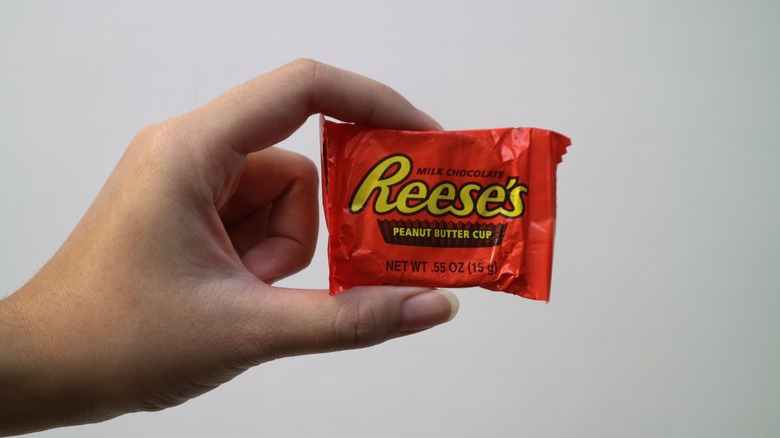What's Really Hiding In A Pack Of Reese's Peanut Butter Cups
When you're a peanut butter lover who's a fan of chocolate, too, you may be tempted to enjoy Reese's Peanut Butter Cups as a dessert or snack. The only issue? When you do, you might be getting more than you bargained for — and a less-than-healthy treat. While these top candies are undeniably popular among people with a sweet tooth, they're not necessarily recommended for everyday eating if you're trying to live the healthiest possible lifestyle.
First, though, let's look at the good side of what Reese's Peanut Butter Cups offer because they're not entirely off the table unless you've been told to avoid them by a healthcare professional. For one, they contain peanut butter. When eaten in moderation, peanut butter can offer some surprising body benefits. WebMD acknowledges that peanut butter is a protein, Vitamin E, niacin, and magnesium powerhouse. Therefore, Reese's Peanut Butter Cups aren't totally without nutritional merit.
Reese's Peanut Butter Cups are also covered in milk chocolate, which isn't necessarily unhealthy. Though dark chocolate tends to get more positive press, light chocolate has fans as well, mainly because it contains higher amounts of protein and calcium than dark chocolate, according to MedicalNewsToday.
In other words, Reese's Peanut Butter Cups get a few high marks. No one is going to fault you for considering them as an occasional in-between meal pick-me-up. However, they're not made for daily munching because they have three important characteristics that aren't exactly healthy: their calories, their sugar makeup, and their fat content.
Small sweet treats that are densely caloric and fatty
According to the official Reese's Peanut Butter Cup label, a 1.5-ounce two-pack of these candies will set you back 210 calories. If you're aiming to stay around 2,000 calories a day, which healthline notes is roughly the caloric target for an average adult, that's more than 10% of your daily caloric intake. And you're not getting a lot of other nutrients coming along for the ride. Therefore, all those Reese's Peanut Butter Cup calories aren't being offset by high amounts of vitamins and minerals.
From a sugar perspective, Reese's Peanut Butter Cups aren't a top choice, either. At 22 grams of sugar, they can quickly bring you to 40% of your desired sugar intake for the day. And healthline notes that consuming excessive sugar can cause you to gain unwanted pounds, experience skin problems, and potentially increase your risk of developing certain diseases and cancers. Sugar can also cause your mood to swing. A 2017 study from Scientific Reports concluded that eating higher amounts of sugar could be linked to depression and other negative emotional states.
Finally, let's look at the fat in Reese's Peanut Butter Cups. The saturated fat clocks in at 4.5 grams. As the American Heart Association (AHA) explains, saturated fats have been linked to high cholesterol and other health concerns. Consequently, the AHA recommends keeping saturated fat to 13 grams daily. (That means you get about one-third of your limit in a 1.5 ounce serving.)
Alternative ways to enjoy the Reese's Peanut Butter Cups taste
What can you do if you're craving Reese's Peanut Butter Cups but want to avoid the product's accompanying calories, sugar and fat? One innovative solution could be to "deconstruct" the candy by eating the rawest form of the candy's healthiest ingredients, which are peanuts and chocolate.
Yes, peanuts contain a lot of fat. Yet they're not unhealthy if they're eaten in small amounts. One 2016 study published in the Journal of Food Science and Technology looked at peanuts as a potential "functional food." The study's authors found that the amino acids and bioactive compounds inherent to peanuts make them a healthy, nutrient-dense food source. A one-quarter cup serving of peanuts is about 207 calories, according to WebMD. That's about the same number of calories in a two-cup pack of Reese's Peanut Butter Cups. The difference, though, is that the quarter-cup of peanuts contains no added sugars.
Missing all that chocolatey coating? Add a few pieces of dark chocolate to your handful of peanuts to replicate the general flavor of a Reese's Peanut Butter Cup. According to a 2022 article published in Current Research in Food Science, dark chocolate (like peanuts) is also a functional food. With its anti-inflammatory and immune-boosting properties, it's a nice addition to a handful of peanuts. Just go easy. Dark chocolate still contains sugars and fats, as noted by WebMD.
Final thoughts? It may be best to save Reese's Peanut Butter Cups for special occasions.


